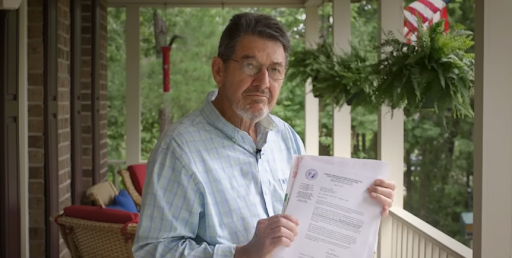On Dec. 20, Chief Judge Richard Myers of North Carolina ruled that the North Carolina Board of Examiners for Engineers and Surveyors (NCBELS) violated the First Amendment rights of retired engineer, Wayne Nutt, who NCBELS threatened with criminal charges for “practicing engineering without a license” after he shared his expertise on public works in court.
Nutt, 77, graduated with a degree in engineering from the University of Iowa in 1967, and worked as a chemical engineer for decades until his retirement in 2013.
During his career he worked on projects like designing piping systems and helping with international technology licensing.
Nutt became the target of threatening letters after he testified in court on why certain homes in his community were flooding.
He based his explanations on publicly available information and his expert knowledge.
Success
You are now signed up for our newsletter
Success
Check your email to complete sign up
In North Carolina, it is illegal to practice engineering without a license, though Nutt had previously practiced engineering under an “industrial exemption,” not a license, due to the fact he worked for Dupont for most of his career.
The NCBELS argued that Nutt’s testimony amounted to practicing engineering without a license since he was unlicensed at the time of his testimony.
In June 2021, Nutt told Vice, “I’m potentially to be charged with a class 2 misdemeanor … which could be a fine of up to $1,000 and 60 days in jail.”
Nutt decided to sue and was represented, pro bono, by the Institute for Justice (IJ) a nonprofit, public interest firm that’s mission is “to end widespread abuses of government power and secure the constitutional rights that allow all Americans to pursue their dreams.”
READ MORE:
- Massive Earthquake Rocks China as Rescue Efforts Are Hampered By Frigid Temperatures
- China’s ‘Global Police State’: New Report Unravels the CCP’s Transnational Repression and Its Impact on US National Security
- US Announces Global Nuclear Fusion Strategy at COP28
Free speech win
The NCBELS argued that Nutt’s testimony, which required “engineering knowledge,” was illegal even though he truthfully disclosed his credentials and the judge wanted to hear his testimony.
Lawyers working on Nutt’s case hired a licensed engineer to look over Nutt’s testimony and work and approve it, which they did.
“It might seem impossible to ‘practice’ engineering by sitting in a conference room answering questions, but, shockingly, the Board seems to think Wayne crossed a line,” the IJ wrote in a blog post concerning the case.
Announcing Nutt’s court win, IJ attorney, Joe Gay wrote, “State licensing boards nationwide increasingly act as if they are boards of censors, deciding who may or may not speak about the topics they regulate,” adding that, “Today’s ruling is a powerful reminder that in this country we rely on people to decide who they want to listen to. We don’t rely on government boards to decide who gets to speak.”
According to the ruling, the judge wrote, “…although the government may properly exercise its interests in policing the use of technical knowledge for nonexpressive purposes, those interests must give way to the nation’s profound national commitment to free speech in this case.”
In conversation with IJ, Nutt said, “This is a win for more than just me. There are a lot of people in the same situation—people who have expertise that they’ve been blocked from talking about. This decision is an affirmation that the First Amendment protects all of our rights to share what we know.”
Robert McNamara, IJ Deputy Director of Litigation, wrote, “The First Amendment protects everyone’s right to speak their minds, whether they’re talking about politics or talking about math. Regulators often seem to forget that basic fact, but we always stand ready to remind them.”
















